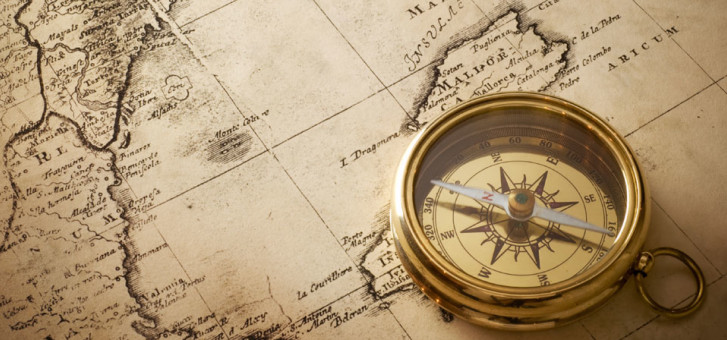Not many real-life maritime experiences are as dramatic as that involving William Bligh and the mutiny on board his transport ship Bounty in 1789.
A little more than 200 years ago, Bligh embarked on a breadfruit expedition into the Pacific under the patronage of his friend and mentor, Sir Joseph Banks. As Britain's most famous naturalist, Banks's reputation had been built up through his journeys with Britain's most eminent sailor-navigator of the age, Captain James Cook. This brought Banks into friendship with the little-known Lieutenant Bligh, who had served under Cook, on his third great Pacific voyage in 1777.
The need for a breadfruit expedition was mooted among British traders and plantation owners who wanted to economise in provisions for their West Indian slaves. Breadfruit was suggested as an alternative food source that might be the answer to their quest. To this end, Bligh was commissioned through Banks's influence to take a ship into the Pacific and to come back with as many breadfruit plants as he could for West Indian delivery.
After a foreboding delay in setting off in late 1787, Bligh eventually headed south-west from Portsmouth to Terra del Fuegos, aiming to take the shortest route to Tahiti and beyond. Stormy weather forced him to abandon that idea and to reroute his Bounty eastward around the Cape of Good Hope, east around the bottom of Australia and New Zealand and then north-east to Tahiti.
Despite usual discipline problems during his long voyage into Oceania, Bligh could not have known what lay ahead. His late departure from Portsmouth meant he could not avoid a Pacific wet season. This resulted in an extended stay in Tahiti during which time, the effect of the hospitable Tahitians, their culture and customs, and the contrast between the seemingly easy life in the Pacific and the dour life of England, all conspired to alter the perspective of Bligh's crew and to destabilise the mental condition of some.
Chief among those adversely affected were Bligh's master's-mate, Fletcher Christian, and a group of seamen. But dissent in Her Majesty's Navy was nothing novel. It was hard to gain happy sailors because of the harsh nature of their work and their depressed conditions of employment—pay for British seamen had been static for about 150 years. A captain had, therefore, to be tough and disciplined by necessity, and any worth his salt, not only ritually administered floggings, but experienced at least one mutiny and court martial during his career. Many had seen more.
Bligh was no exception in shipshape rigour. On his Bounty he took pride in applying habits he had learned under the greatest and toughest disciplinarian of them all, Cook. They were to especially maintain a clean (vinegary) ship, a healthy, sober crew, and a strictly rationed food supply. Bligh's log of his journey was at first rapturous about the good-natured cooperation he obtained from his crew. But as weather, conditions, time and distance works to unsettle the sociability of confined men, Bligh's authority began to suffer. Signs of insubordination emerged in little ways and, as always, at the edges.
These were to spill over into outright mutiny after five months sojourn in tropical Tahiti. When the weather turned, and with his ship successfully loaded with breadfruit, Bligh and his now Tahitian-acculturated crew bade farewell. This was especially painful for their Tahitian hosts. Many of Bligh's men had tattooed themselves in the Polynesian custom, had taken Tahitian women as wives, and some were conversant in the language. Some left women behind who were pregnant.
The first three weeks of the Bounty's return journey to England brought Bligh and his crew to Tonga and to a spectacular confrontation. Early on the morning of April 28, 1789, master's mate Fletcher Christian led a conspiracy to take the ship off Bligh and return to Tahiti. The pyjama-clad captain and 18 supporters were forced by arms over the side of the Bounty and into a four-metre boat loaded with about five days worth of supplies. Some of Bligh's other supporters were held under threat on board the Bounty—the mutineers required their services. Moreover, the boat bearing Bligh was so overloaded it sat a mere 20 centimetres above the ocean surface.
For their part, Fletcher Christian and his mutineers reasonably believed they were consigning their harsh commander and his loyalists to certain death as they proceeded to drink themselves drunk before heading back to Tahiti and the comforts they had become accustomed to. But as the shocked and outraged Bligh was set adrift, he promised his weeping loyalists left on board on the Bounty: “Never fear, my lads; I'll do you justice if ever I reach England.”
The 19 men cast off in their launch in southern Tonga possessed a quadrant, a compass, some navigation tables, a broken sextant, but no maps. After initially losing one man to a hostile Tongan reception on Anamuka, Bligh resolved never to step ashore in the Pacific again, but to plough on in the hope of reaching Timor and Java, where he knew Dutch civilisation was stationed.
One month later, Bligh had successfully navigated his overcrowded launch to the tip of northern Australia. Two weeks later he and his men arrived in Timor, and one week later they were in Batavia, the main Dutch port of the East Indies. Bligh had brought his boat full of loyal crew through more than 6000 kilometres of Pacific storms, illness, cramped-conditions, and near-starvation, without losing a man. No other sailor has achieved such a feat.
By March 1790, almost a year after being mutinied, Bligh and two of his fellow survivors arrived back in England via a Dutch ship. Within days they were the toast of Britain with their incredible story of survival against the odds. Bligh succeeded further with his acquittal at the obligatory court martial into how he had lost his ship to mutineers. His “reward” was to be sent back to the Pacific on a second breadfruit mission. As he waited to be commissioned, in November that year (1790), another ship, the Pandora, was sent with the mission of recovering the mutineers from the Pacific.
The Pandora spent three months cruising the islands of Tahiti, the Cooks, Tokelau, Samoa and Tonga, before heading back to England with 10 mutineers in irons. It got as far as Torres Strait, but ran aground. Nevertheless, Pandora's officers managed to keep their prisoners and eventually they also, like the captain they had deposed two years earlier, found their way back to England via Timor and Java. But where Bligh returned triumphant, they returned in chains. Once in England, all but two were found guilty of mutiny and, as was typical, they were hung on gibbets along the Thames at Portsmouth Harbour.
Meanwhile, Fletcher Christian and his mutineers meandered their way from Tonga to Tahiti to the Cooks. They then headed into southern Fiji (Ono-i-lau) before again heading to Tonga. This restless and wild bunch then set out for the legendary Pitcairn Island, which they stumbled upon and settled in January 1790—some nine months after they mutinied, all the while oblivious to the fact that Bligh and his loyalists were finding their way back to England. Thus began, for Christian and his rebels, the invention and settlement of a new ethnic group we know today as Pitcairn Islanders.
As I reflected on this great drama as found in Caroline Alexander's recent worthy book, The Bounty (HarperCollins, 2003), Bligh was a flawed, but sympathetic hero; his nemesis, Fletcher Christian, was a complex character from aristocratic stock, better-connected than the middle-class Bligh, but even more flawed. Christian's courage was sufficient to prepare his mutineers for their sabotage and for reaching their promised (is)land, but he lacked the strength of character to make their bold experiment at establishing a new society work. After a series of murders on Pitcairn, that task of institution-building fell to another, Alexander Smith, known to the world as John Adams.
Bligh succeeded in his second breadfruit expedition but returned to England more as villain than hero—the Christian family recovered the initiative through their connections during his absence. They used the press to portray Bligh as part-villain in the whole affair. Bligh was tested by another mutiny, and was finally “exiled” to Botany Bay, New South Wales. But as governor-in-residence at Port Jackson penal colony, he was victim to yet another mutiny—what became known as the Rum Rebellion.
The end of persons, not our beginnings, is where history judges us most harshly. True to his belief in discipline, Bligh symbolises the legalist in us who refuses to give an inch to gain approval. He knows the law, enforces it against the grain of context and culture but is correspondingly alienated from those he most wants to command. Law for him is a matter of authority and maintaining structures of obedience without which his entire identity would collapse.
Bligh is to be admired for his courage, his knowledge and his unswerving purposefulness. More than anything, legalists know the way home and how to get there. Like Bligh, they understand struggle against nature. They can come up victorious against the odds. But once “home,” they can succumb to death. Through Bligh, his men made it to safety only to die in hospitals where they were recovering. The survival operation was a great heroic success, but in the end the patients died. Thus it is with legalists.
Fletcher Christian, on the other hand, represents the libertine in all of us. He is the free spirit who could not but think wantonly of the freedom of expression that Tahiti had allowed. His body was tattooed and so was his soul. Once he tasted the forbidden fruit of what he imagined was paradise, there was no going back to England.
His men ran riot among naked breasted women of stature and beauty that not even the English aristocracy could dream of. Unlimited in their desires, these libertines tasted whatever pleasure they wished, whenever they felt like, at no apparent cost to their futures.
But of course, there always is a price to pay. Untrammelled freedom and liberty gives way to licentiousness, which gives way to avarice, which gives way to violence as each wants more of what they are already sated with, but do not recognise. In the end, freedom killed them.
Life for us is lived between fulfilling the strictures of William Bligh and filling full the sensate desires of Fletcher Christian. We have a long voyage to complete that requires self-discipline and obedience. But we are also mutineers engaged in a struggle for our own independence and freedom from our past.
We must recognise more than Bligh the need for civility tempered with compassion, the need to moderate our sense of justice with mercy. And more than Fletcher Christian, we must admit our accountability, that sooner or later there is a settling up, a squaring of the ledger, a court to face, and a judgment to be handed down. Depending on how we have acted in relation to our captain, we will welcome the sight of Pandora who comes to get us, or run for the hills like desperate mutineers.




